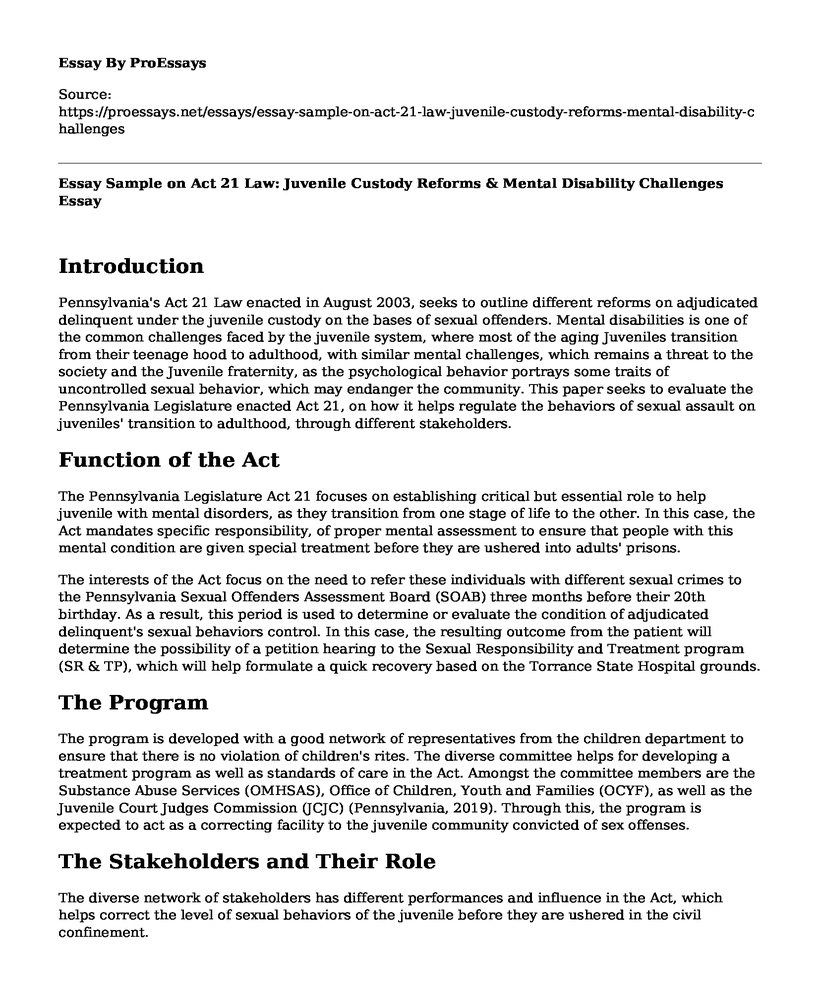Introduction
Pennsylvania's Act 21 Law enacted in August 2003, seeks to outline different reforms on adjudicated delinquent under the juvenile custody on the bases of sexual offenders. Mental disabilities is one of the common challenges faced by the juvenile system, where most of the aging Juveniles transition from their teenage hood to adulthood, with similar mental challenges, which remains a threat to the society and the Juvenile fraternity, as the psychological behavior portrays some traits of uncontrolled sexual behavior, which may endanger the community. This paper seeks to evaluate the Pennsylvania Legislature enacted Act 21, on how it helps regulate the behaviors of sexual assault on juveniles' transition to adulthood, through different stakeholders.
Function of the Act
The Pennsylvania Legislature Act 21 focuses on establishing critical but essential role to help juvenile with mental disorders, as they transition from one stage of life to the other. In this case, the Act mandates specific responsibility, of proper mental assessment to ensure that people with this mental condition are given special treatment before they are ushered into adults' prisons.
The interests of the Act focus on the need to refer these individuals with different sexual crimes to the Pennsylvania Sexual Offenders Assessment Board (SOAB) three months before their 20th birthday. As a result, this period is used to determine or evaluate the condition of adjudicated delinquent's sexual behaviors control. In this case, the resulting outcome from the patient will determine the possibility of a petition hearing to the Sexual Responsibility and Treatment program (SR & TP), which will help formulate a quick recovery based on the Torrance State Hospital grounds.
The Program
The program is developed with a good network of representatives from the children department to ensure that there is no violation of children's rites. The diverse committee helps for developing a treatment program as well as standards of care in the Act. Amongst the committee members are the Substance Abuse Services (OMHSAS), Office of Children, Youth and Families (OCYF), as well as the Juvenile Court Judges Commission (JCJC) (Pennsylvania, 2019). Through this, the program is expected to act as a correcting facility to the juvenile community convicted of sex offenses.
The Stakeholders and Their Role
The diverse network of stakeholders has different performances and influence in the Act, which helps correct the level of sexual behaviors of the juvenile before they are ushered in the civil confinement.
The Sexual Offenders Assessment Board (SOAB), has the mandate of completing periodic and initial assessments upon referrals, which helps make recommendations to the court, as well as testifying in the court's proceedings (Pennsylvania, 2019). On the other hand, the board is also bequeathed with the mandate of providing on-going training to assessors and other relevant stockholders.
On the other hand, the Juvenile Courte Judges Commission (JCJC), has the mandate of overseeing and preparing the court proceedings to ensure that free and fair trials are exercised in the court proceedings.
The Juvenile Detention Facilities (JDF) have the responsibility of providing housing for the client during their assessment progress. In other words, the department helps reduce the interference of the assessment from the client's house, which may prolong the entire activity.
Conclusion
In the bottom line, the primary purpose of Pennsylvania's Act 21 Law is to ensure that the juvenile tuning 21 years are reinstalled in the community without any possible threats to the community that may portray any poor sexual behaviors. As a result, the Act is monitored by several different stakeholders that make the program to ensure that no violation of rites during the program are experienced.
Reference
Pennsylvania. (2019). PA DHS - Act 21. Retrieved from http://dhs.pa.gov/provider/mentalhealth/act21/
Cite this page
Essay Sample on Act 21 Law: Juvenile Custody Reforms & Mental Disability Challenges. (2023, Jan 20). Retrieved from https://proessays.net/essays/essay-sample-on-act-21-law-juvenile-custody-reforms-mental-disability-challenges
If you are the original author of this essay and no longer wish to have it published on the ProEssays website, please click below to request its removal:
- Adolescents Suicidal Tendencies - Sociology Paper Sample
- Blacks and the Constitution Essay Example
- Love Does Not Come From Outside of Oneself Essay
- A Discussion on Attention Deficit Hyperactive Disorder Paper Example
- Increasing Gun-Related Violence Essay Example
- Benefits of Medical Marijuana and Its Legality
- Aging: Implications on the Health Care System & Need for Aggressive Medical Interventions - Essay Sample







